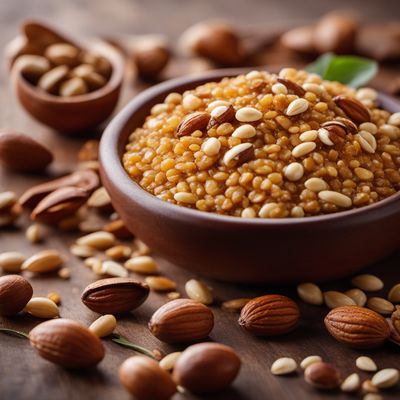
Ingredient
Dried nuts/seeds and related flours and powders
Nature's Nutty Treasures: Exploring the World of Dried Nuts, Seeds, and their Versatile Flours and Powders
Dried nuts and seeds, such as almonds, walnuts, sunflower seeds, and pumpkin seeds, undergo a dehydration process that intensifies their flavors and extends their shelf life. These ingredients possess a delightful crunch and a range of textures, from creamy to crunchy. They come in various shapes, sizes, and colors, with each nut or seed offering a unique taste profile. The resulting flours and powders, made by grinding these dried ingredients, are finely textured and can be used as gluten-free alternatives in baking or as flavor enhancers in sauces, dressings, and smoothies.
Origins and history
The consumption of dried nuts and seeds dates back thousands of years, with evidence of their use in ancient civilizations such as the Egyptians, Greeks, and Romans. Nuts and seeds were highly valued for their nutritional density and long shelf life, making them ideal for sustenance during long journeys and harsh climates. Over time, these ingredients spread across different regions, becoming integral to various cultural cuisines and traditional dishes.
Nutritional information
Dried nuts and seeds are powerhouses of nutrition, packed with essential nutrients such as healthy fats, protein, fiber, vitamins, and minerals. They provide a good source of energy and are rich in antioxidants, promoting heart health and reducing the risk of chronic diseases. While the nutritional content varies among different nuts and seeds, they generally offer a balanced combination of nutrients, making them a valuable addition to a well-rounded diet.
Allergens
Nuts and seeds are known allergens, with common allergies including peanuts, tree nuts (such as almonds, walnuts, and cashews), and sesame seeds. Individuals with known allergies should exercise caution and read labels carefully to avoid potential allergens.
How to select
When selecting dried nuts and seeds, look for those that are plump, firm, and free from mold or rancid odors. For flours and powders, opt for reputable brands that use high-quality ingredients and ensure proper storage to maintain freshness.
Storage recommendations
To maintain the freshness and quality of dried nuts and seeds, store them in airtight containers in a cool, dark place, such as a pantry or refrigerator. Flours and powders should be kept in sealed containers and stored in a cool, dry place to prevent moisture absorption and maintain their texture.
How to produce
Amateur gardeners can grow certain nuts and seeds, such as almonds, walnuts, sunflower seeds, and pumpkin seeds, by planting the respective trees or plants in suitable climates. However, the process requires patience, as it can take several years for the trees to mature and produce a significant yield.
Preparation tips
Dried nuts and seeds can be enjoyed as a snack on their own, roasted for added flavor, or incorporated into a variety of dishes. To enhance their flavors, lightly toast them in a dry skillet or oven before use. They can be ground into flours or powders using a food processor or blender, adding a nutty richness to baked goods, smoothies, or sauces. When using nut or seed flours as a gluten-free alternative, it is advisable to combine them with other gluten-free flours for optimal texture and structure.
Culinary uses
Dried nuts and seeds, as well as their derived flours and powders, are widely used in both sweet and savory dishes. They can be sprinkled over salads, incorporated into granolas or trail mixes, used as a topping for yogurt or oatmeal, or ground into nut butters. In baking, they add texture and flavor to cookies, cakes, and bread. Nut and seed flours are excellent alternatives for gluten-free baking, providing a unique taste and texture to pancakes, muffins, and breads.
Availability
Dried nuts and seeds, as well as their flours and powders, are commonly available in grocery stores, supermarkets, and health food stores worldwide. They are cultivated in various regions, including North America, Europe, Asia, and South America.

